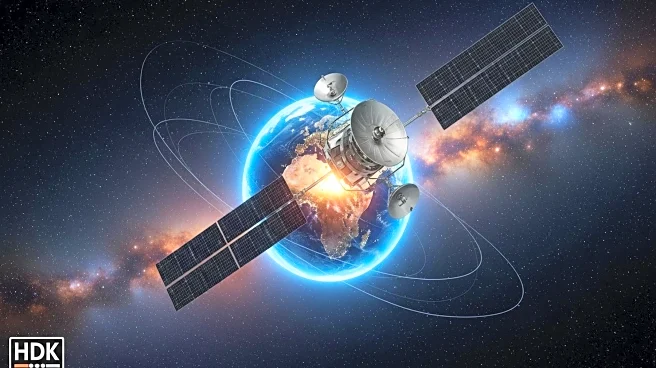What's Happening?
The UK government has announced the integration of the UK Space Agency (UKSA) into the Department for Science, Innovation and Technology (DSIT) by April. This decision, revealed on August 20, aims to streamline operations by reducing duplication and ensuring decisions are made with clear ministerial oversight. The UKSA, established in 2010, has been primarily funded by DSIT since 2023. The merger is part of a broader initiative by the Labour government to cut government expenditure and civil service costs by 15% by the end of the decade. Insiders have noted that the agency's role had been under scrutiny since 2020, with concerns that it had become isolated and overly aligned with the European Space Agency (ESA), to which the UK allocates most of its civilian space budget.
Why It's Important?
The absorption of UKSA into DSIT could have significant implications for the UK's space ambitions and its position within the ESA. The move is seen as a way to consolidate the UK's space strategy and align it more closely with national interests. However, there are concerns that this could weaken the UK's influence within ESA, especially with an upcoming ESA Council of Ministers meeting that will decide funding for the next three years. The decision reflects a shift in the UK's approach to space, focusing more on national priorities rather than solely on ESA's agenda. This could impact the UK's ability to foster a strong domestic space industry and maintain its competitive edge in the global space sector.
What's Next?
The integration process will likely involve significant changes within the government, potentially slowing down progress and making priorities less clear in the short term. The UK government will need to navigate its relationship with ESA carefully to ensure that its contributions and influence are not diminished. The upcoming ESA Council of Ministers meeting will be a critical juncture for the UK to assert its position and negotiate its role within the agency. Additionally, the UK will need to address concerns from industry stakeholders about the potential loss of an independent space agency, which could affect the country's long-term space strategy and ambitions.
Beyond the Headlines
The decision to absorb UKSA into DSIT raises questions about the future of the UK's space policy and its ability to compete with other European nations that have dedicated space agencies. The move could signal a return to a model similar to the pre-2010 British National Space Centre, which lacked an independent budget and faced challenges in negotiating with ESA. This could impact the UK's ability to drive innovation and growth in its space sector, which has seen significant expansion over the past 15 years. The integration may also affect international partnerships and collaborations, as the UK seeks to balance its national interests with its commitments to ESA.









